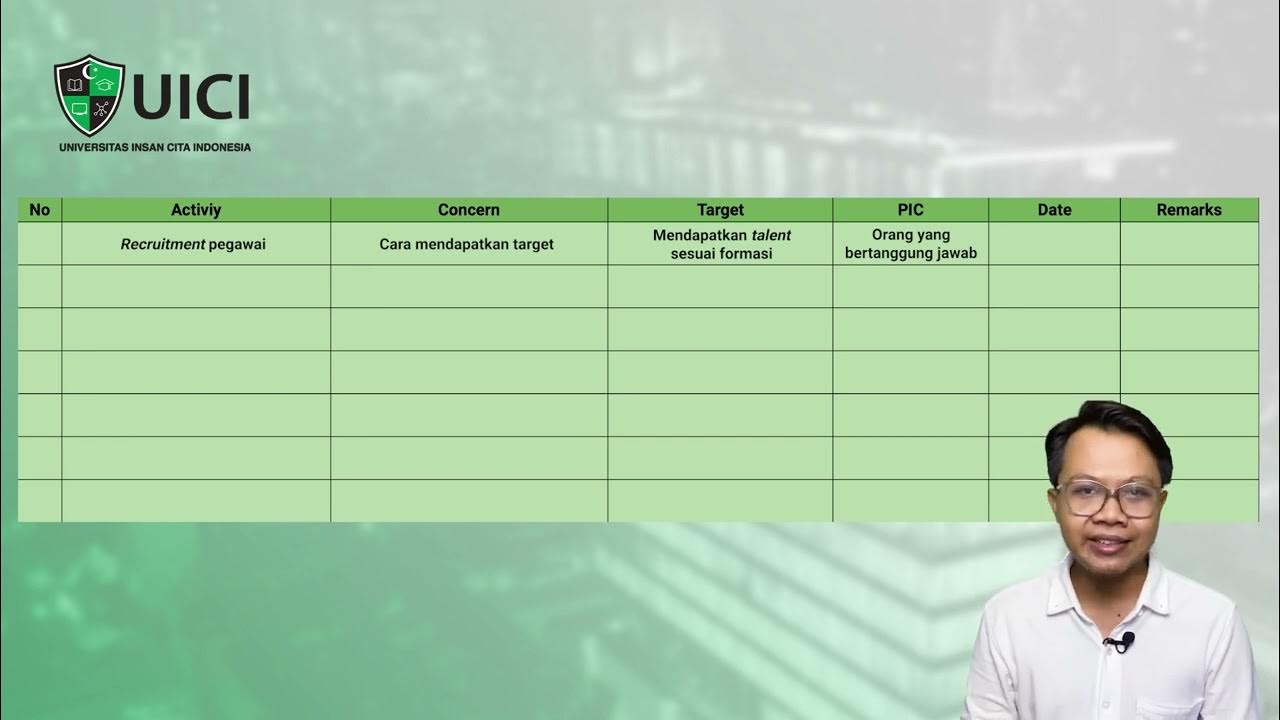Planning/Process/Types of Plan/Challenges of Planning/Management Principles and Applications
Summary
TLDRThe video discusses the essential role of planning in management, highlighting its definition as the process of determining future actions to achieve organizational objectives. It emphasizes characteristics such as being forward-looking, objective-driven, and efficiency-focused. Various types of plans, including programs and procedures, are outlined alongside the planning process involving information analysis and alternative evaluations. The challenges of uncertainty and inflexibility in planning are noted, along with the importance of planning for coordination and motivation within organizations. Overall, effective planning is presented as a crucial element for success in dynamic environments.
Takeaways
- 😀 Planning is a critical management function that involves deciding future actions and the sequence required to achieve objectives.
- 🧠 Effective planning requires mental effort and is essential at all management levels: top, middle, and lower.
- 🔍 A key aspect of planning is looking forward and preparing for future challenges while remaining adaptable to change.
- ⚙️ Planning enhances efficiency and ensures resources are used effectively towards achieving organizational goals.
- 📅 Various types of planning include programs, schedules, procedures, and rules, each serving specific organizational needs.
- 📊 The planning process involves gathering, analyzing, and classifying information to make informed decisions.
- 🔄 Identifying alternative courses of action is crucial for achieving objectives and should consider available resources.
- ✔️ Evaluation of alternatives helps determine the best course of action based on constraints and organizational goals.
- 💡 Planning fosters motivation and clarity by setting clear objectives for employees and aligning efforts.
- 🚧 Challenges in planning include uncertainty, lack of forecasting knowledge, and organizational inflexibility, which can hinder effective strategic development.
Q & A
What is the primary function of management according to the script?
-The primary function of management is planning, which involves determining future actions and laying out a sequence to achieve objectives.
How is planning characterized in terms of its temporal focus?
-Planning is characterized as a forward-looking process that focuses on anticipating future actions and outcomes.
What are the key components involved in the planning process?
-The key components of the planning process include goal setting, assumption formulation, information collection, identifying alternatives, and evaluating those alternatives.
What types of plans are mentioned in the script?
-The types of plans mentioned include programs, schedules, procedures, rules, and standing plans.
What role do procedures play in planning?
-Procedures provide detailed methods for carrying out tasks and outline standard ways to perform various activities.
Why is accurate forecasting important in the planning process?
-Accurate forecasting is crucial because it helps managers anticipate future conditions that could impact their planning and decision-making.
What challenges might managers face in the planning process?
-Managers may face challenges such as inaccurate forecasting, inflexibility in plans, lack of knowledge regarding planning techniques, and lack of confidence in decision-making.
How does planning enhance organizational efficiency?
-Planning enhances organizational efficiency by optimizing resource use, providing clear direction, and improving coordination among team members.
What is the significance of standing plans?
-Standing plans are important as they are used repeatedly for recurring situations, ensuring consistency in how certain situations are handled.
What is the impact of managerial confidence on planning?
-A lack of confidence can lead managers to prefer day-to-day operations over long-term planning, potentially hindering organizational progress.
Outlines

This section is available to paid users only. Please upgrade to access this part.
Upgrade NowMindmap

This section is available to paid users only. Please upgrade to access this part.
Upgrade NowKeywords

This section is available to paid users only. Please upgrade to access this part.
Upgrade NowHighlights

This section is available to paid users only. Please upgrade to access this part.
Upgrade NowTranscripts

This section is available to paid users only. Please upgrade to access this part.
Upgrade Now5.0 / 5 (0 votes)





